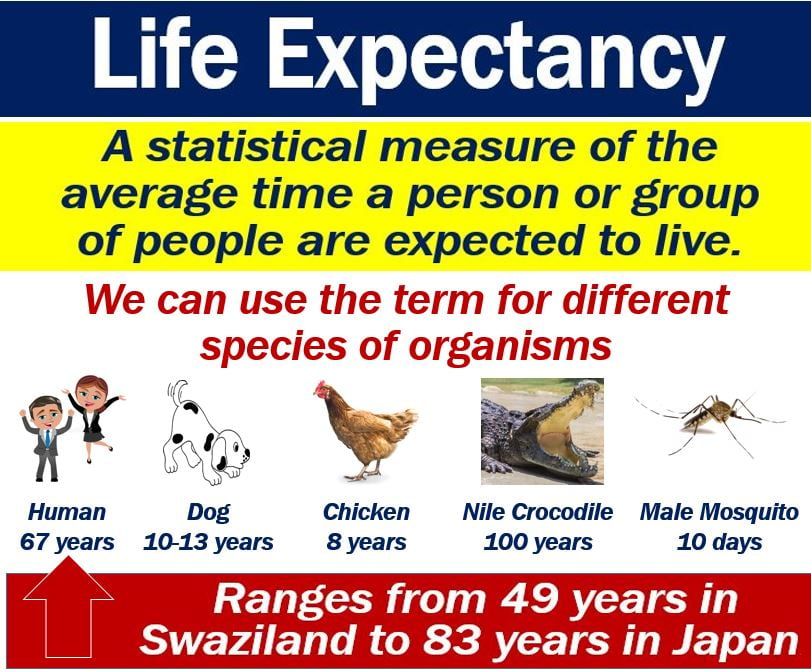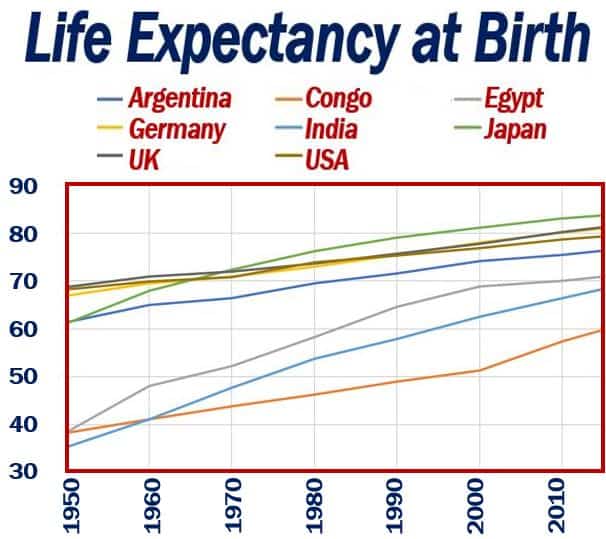What is life expectancy? Definition and examples
Life expectancy refers to the number of years we expect a person to live. We can use the term for a person, group of people, town, region, whole country, or even other organisms. In most cases, a national statistical organization determines and publishes these figures. We also call it ‘expectancy of life.’ Some people use the term ‘expected lifespan.’
People’s life expectancies vary according to location and gender. They also vary according to time. For example, during the 15th century, the lifespans in Europe were between 30 and 40 years. Now, they range from 80 to 85 years in the advanced economies, i.e., the rich countries.
The life expectancy of each country depends on factors such as national health services and financial status. Lifestyle, child mortality, occupation, armed conflict, and nutrition are also affecting variables.
Life expectancy – all species
We can use the term for all organisms; not just humans. Scientists say that organisms with long lifespans probably have genes that code for slow aging. In other words, they have good cellular repair.
The Arctic whale (bowhead) is by far the longest-living mammal; it can live more than 211 years.
The mayfly, on the other hand, only lives 24 hours. It has the shortest life expectancy among creatures that are not microscopic, i.e., they’re visible with the naked eye.

Here is a list of the life-expectancies of 20 animals, from very long to very short:
- Greenland Shark – Approximately 300-500 years.
- Bowhead Whale – Up to 200 years.
- Galápagos Giant Tortoise – Up to 177 years.
- African Elephant – 60 to 70 years.
- Human – Worldwide average is around 67 years (varies by country).
- Gorilla – 35-40 years (wild), up to 50+ years (captivity).
- Chimpanzee – 30-40 years (wild), up to 60 years (captivity).
- Koi Fish – 25 to 35 years (however, some have been known to live over 200 years).
- Horse – 25 to 30 years.
- California Sea Lion – 20 to 30 years.
- Bald Eagle – Around 20 years in the wild.
- Domestic Dog – 10 to 13 years, depending on the breed.
- Domestic Cat – 12 to 15 years.
- Rabbit (Domestic) – 8 to 12 years.
- Pigeon – Typically 6 to 15 years in the wild.
- Guinea Pig – 4 to 8 years.
- House Sparrow – Typically 3 to 5 years.
- Mouse – 1 to 2 years in the wild, slightly longer in captivity.
- Honey Bee (Worker) – 5 to 6 weeks during productive seasons; however, overwintering workers can live several months.
- Mayfly – The adult stage lives for only 24 hours to a few days, depending on the species.
Life expectancy getting longer
People’s lifespans have been getting longer since the Age of Enlightenment. The ‘Enlightenment’ was a philosophical and intellectual movement that existed in Europe during the 18th century.
However, over the past 200 years, people’s life expectancy has doubled in some countries.
According to the ONS (Office of National Statistics), in 1841, life expectancy in the UK was of 40.2 years for men and 42.2 years for women. By 2015, it rose to 79.09 and 83 years for men and women respectively.
The World Health Organizations (WHO) says that globally women live on average 4.6 years longer than men.
Life expectancy – GDP per capita
There is a close link between GDP per capita and life expectancy. Countries with a high GDP per capita have longer life expectancies than those with a low GDP per capita.
GDP stands for Gross Domestic Product, i.e., a country’s total production of goods and services within a set time. To get GDP per capita, we divide GDP by the country’s total population.

Here is the life expectancies of the top 10 and bottom 10 countries in the world, plus the US and UK:
- Monaco – Approx. 89 years
- Japan – Approx. 85 years
- Singapore – Approx. 85 years
- Macau – Approx. 84 years
- San Marino – Approx. 83 years
- Iceland – Approx. 83 years
- Hong Kong – Approx. 83 years
- Switzerland – Approx. 83 years
- South Korea – Approx. 83 years
- Israel – Approx. 83 years
- United Kingdom: Approximately 81 years
- United States: Approximately 77 years
- Central African Republic – Approx. 53 years
- Lesotho – Approx. 54 years
- Chad – Approx. 54 years
- Nigeria – Approx. 54 years
- Sierra Leone – Approx. 54 years
- Somalia – Approx. 57 years
- Ivory Coast – Approx. 57 years
- South Sudan – Approx. 57 years
- Guinea-Bissau – Approx. 58 years
- Equatorial Guinea – Approx. 58 years
Life expectancy in business
In business, life expectancy is relevant for insurance, annuity contracts, and retirement plans.
-
Insurance
Companies with insurance services will calculate lifespans to minimize their liability risk.
Insurance companies will look at certain factors to determine individual risk factors. They will take into consideration factors such as medical history, lifestyle, and occupation.
A librarian, for example, has a smaller risk of ‘dying on the job’ than a bullfighter or test pilot.
All these factors influence people’s risk of experiencing or suffering an adverse event. The higher the risk, the greater the chances are of an insurance claim.
-
Annuity contracts
In some cases, companies may offer a single-life annuity payment plan. In other words, payments continue until the person dies.
An annuity is a terminating stream of fixed payments. Companies pay out annuities over specific periods.
-
Retirement plans
When considering a retirement plan, calculating a person’s life expectancy is important. The pension company has to estimate how long it will have to continue paying out money.
When the pension involves a couple, it will take into consideration both their lifespans.
Video – What is Life Expectancy?
This interesting video presentation, from our sister channel in YouTube – Marketing Business Network, explains what Life Expectancy is using simple and easy-to-understand language and examples.

